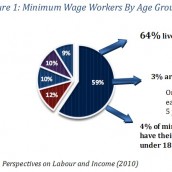Seeking protection for employers from drastic minimum wage increases
The Labour Relations Agency released the advisory committee’s review on minimum wage yesterday. The three-member advisory committee was appointed this summer and solicited public and stakeholder submissions on the minimum wage. The report outlined two recommendations for the Provincial Government to consider:
- That the minimum wage be increased in 2013 to reflect the loss of purchasing power in the minimum wage since 2010. The increase should be preceded by at least six months notice to stakeholders and the public; and,
- Beginning in 2014, that the minimum wage be adjusted annually based on the previous year’s all-items Consumer Price Index for Newfoundland and Labrador. Adjustments would be announced to the public by January 31 of each year and implemented on May 1 of each year. They would be rounded to the nearest $0.05.
Newfoundland and Labrador has increased its minimum wage from $6 to $10 since 2005, representing a 67 per cent increase.
The NLEC is fundamentally opposed to any increase in minimum wage.
The NLEC submission to the minimum wage review committee Who Really Pays: Why increasing Newfoundland and Labrador’s minimum wage could do more harm than good presented economic evidence indicating minimum wage increases have significant negative impacts on jobs and the economy, and actually hurt the people they are believed to help. Minimum wage increases cause negative impacts on minimum wage earners (primarily students and youth), those living below the poverty line, consumers, businesses – particularly those in rural communities, and our economy.
The NLEC is particularly opposed to an increase in the minimum wage in 2013, so soon after the massive 67% increase experienced from 2005-2010, to which many employers are still struggling to adjust.
The NLEC does support removing the politics from minimum wage setting. The NLEC has, and continues to, ask government for increased protection at law for employers from minimum wage increases of such magnitude and in such short time frames. If government chooses to ignore the weight of evidence demonstrating the negative impact of minimum wage increases, any increase must be gradual, based upon economic conditions, and preceded by a significant notice period for employers. However, the NLEC believes a less volatile indicator than CPI be used and that the indicator should act as a a ceiling that government uses when setting minimum wage, and that they retain the right hold on minimum wage increases if necessitated by economic conditions.
The NLEC has reacted publicly on the release of this report, and will continue to lobby against increases in minimum wage. View just some of the recent media coverage on this issue:
CBC-TV “Here & Now” December 7th
CBC Radio “Radio Noon Crosstalk” December 11th
NTV “Evening News” December 7th
VOCM-AM (Print & Online) December 7th




